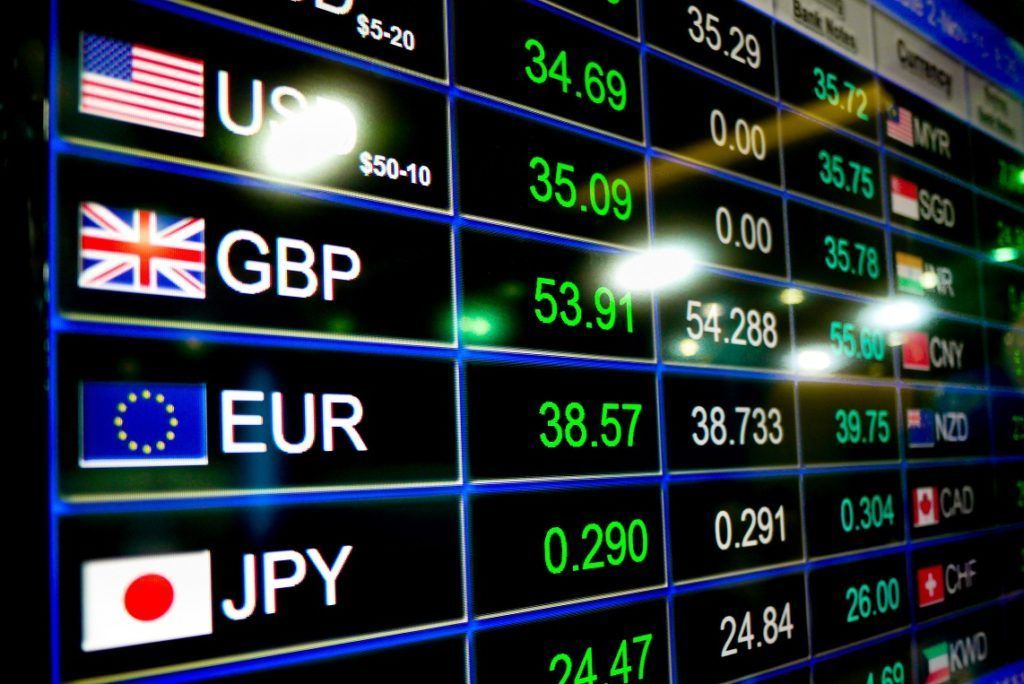Anyone involved in travel, business, or investing must be aware of the difference between online and local exchange rates for currency. Local rates refer to exchange rates provided by the physical currency exchange outlets banks, ATMs, or banks in your local area or at your travel destination. Online rates are those provided through digital platforms and financial institutions to change currencies. These rates are susceptible to major changes, which could be a significant influence on the price you pay for exchange as well as the returns you earn from your investments. By thoroughly understanding the difference between local and online exchange rates, it is possible to make better informed choices which will reduce your expenses. Here are the top 10 specific tips for navigating online and local rates effectively.
1. Know the difference between rates
The local exchange rate may differ significantly from rates on the internet. This is due to various factors like overhead cost as well as market conditions and demand. Local exchange services can have higher fees or less favorable rates due to operational expenses. Online platforms, on the other hand generally offer lower rates because they are less expenses. Understanding the difference between these two can help you select the best exchange rate for your needs.
2. Check Exchange Rates prior to exchanging Currency
Check rates online and locally before exchanging money. Find rates in real time using currency converters. For instance look at the rates provided by banks and exchange kiosks in your country against those that are available online. This will allow you to determine the most efficient solution, and also save you money.
3. Utilize Online Currency Exchange Platforms
- Online exchange platforms like Wise (formerly TransferWise) and copyright often provide more attractive rates and lower costs compared to local banks and exchange kiosks. These platforms typically offer real-time exchange rates and openness regarding fees. With these platforms you can be sure that you are getting the best possible deal when you convert currencies.
4. Be aware of dynamic currency conversion (DCC).
When you buy items in another country, it may appear to pay with your own currency by using Dynamic Currency Conversion. Despite the convenience of this choice, it's often coupled with poor conversion rates and costs. Always make sure to pay locally in local currency in order to avoid the excessive costs associated with DCC and ensure you benefit from higher rates.
5. Compare Cost and Convenience Cost
If you're deciding between local rates as well as the online rate, you must weigh convenience against costs. Local exchanges may provide fast access to cash while you travel. However, online exchanges typically offer better rates but may require the establishment of an account or waiting for funds to be transferred. Assess your needs based on your plans for travel or business needs to decide which one is best for you.
6. Be aware of the changes in exchange rates.
If you keep track of trends in exchange rates it is possible to make more informed decisions on the best time and method to convert your currency. The online platforms typically provide historical data and analysis tools which allow you monitor exchange rate fluctuations. By understanding market trends it is easier to plan your currency exchanges in order to profit from the best rates, either online or locally.
7. Compare ATM fees with local withdrawal limits
Be aware of charges for local withdrawals if you make a withdrawal from an ATM while traveling. Different banks can charge different fees for international transactions ATMs typically have their own limits for withdrawals. Researching local ATMs before your travels will assist you in finding ATMs that charge lower fees or with better rates, so you can get the most value from your withdrawals.
8. Find no-cost currency exchange Services
Some platforms on the internet or banks provide free exchange of currency especially for those who have accounts. This can be particularly beneficial for those who frequent travel or companies which frequently deal in foreign currency. Consider opening an exchange account for cheaper rates and less fees.
9. Talk to Financial Experts for Large Transactions
If you have to deal with huge sums of money or currency exchanges that are not easy seeking advice from financial experts can prove beneficial. Currency experts can provide valuable advice regarding the best methods to utilize local and online rates. It is vital for international investors or companies to be aware of their exposure to currency.
10. Make a Plan for the Future For Your Currency Needs
Planning ahead can help you save time and money whether going on business or vacation. You must determine the amount of cash you need to pay for your trip. Then, you can determine which exchange method works best. Think about using online platforms prior to your trip to exchange currency when you find local rates to be unfavorable. This will help that you receive better rates and reduce the risk of losing cash on unfavorable transactions.
With these helpful tips on local versus online rates, you'll be able to navigate the complexities of currency exchange more effectively, whether you're traveling in business, conducting business, or keeping track of investments. Knowing the pros and cons of each method will enable you to make more informed financial decisions that are in line with your goals which will ultimately help you save money and enhancing the overall financial strategies. Read the best AED to USD for site tips including vnd to usd, convert gbp to usd, yen to usd, dollar to canadian dollar, doller to rupee, dollar to php peso, dollar to euro, yen to us dollar, us dollar to colombian peso, pesos to usd and more.

Top 10 Tips For Security And Reliability In Terms Of Rates For Exchange Of Currencies And Rates
Security and reliability are paramount in an increasingly interconnected world. This is especially true for those who travel, conduct business or manage investments. Knowing the security and reliability of different systems is essential for protecting assets and ensuring an efficient operation. Being familiar with security procedures can help reduce risk and make your overall experience with your finances more enjoyable. Here are the top 10 tips to ensure security and reliability for your financial operations.
1. Check out your destination's Safety Standards
Find out about the safety standards of your destination as well as its security situation before traveling. Know the rates of crime and political stability. Sites such as the U.S. Department of State or travel advisors, can provide you with useful information on safety concerns. Understanding what to expect will help you make an informed decision on which hotel to choose or how to travel safely.
2. Utilize Secure Payment Methods
Make sure to use secure payment methods when conducting transactions, particularly when you are abroad. Credit cards are more secure against fraud than debit cards and they also come with additional security features, such as chips or alerts for fraud. Utilize digital wallets and mobile payments systems that protect your financial information during transactions.
3. Make sure you use strong passwords and two-factor authentication
If two-factor authenticaiton is available, use it. Another method of verification is a text message, or an authentication app. This adds an additional layer to security. For security of your account, make sure you update your passwords on a regular basis and do not share them with anyone else.
4. Make sure your devices are secure
Make sure your devices are secured when you travel. You can stop unauthorised users from accessing your device by making use of biometric locks, and PINs. Avoid using public WiFI networks to conduct sensitive transactions. They can be vulnerable. Instead, use a virtual-private network (VPN) that encrypts connections to the internet and safeguard the data you transmit online.
5. Beware of Phishing scams
Phishing scams are common in the digital age and are a threat to businesses, travellers, and investors alike. You should be careful when clicking on links within emails or messages sent by unknown sources. Check the legitimacy of any request prior to you provide personal or financial details. To avoid potential scams, it is important to be aware of the most commonly used phishing techniques.
6. Select a dependable service provider
You can learn more about a company's reliability through reading customer reviews. Look for institutions that have a reputation for excellent customer service and security. Check if they're regulated. This will give you assurances about their reliability and compliance with industry standards.
7. Be sure to regularly monitor your financial accounts.
Be vigilant over your accounts' financial records for any unauthorised transactions or suspicious activity. Set up alerts for your account which notify you of significant transactions, withdrawals, or changes to your account settings. Monitoring your account regularly will enable you to detect fraud before it occurs and take steps to protect your accounts.
8. Find out about insurance options
Understanding the different kinds of travel insurance that are available is essential for travelers. This will ensure they are secure and trustworthy while on their trip. Take into consideration policies that offer coverage for cancellations of trips, lost or stolen items, as well medical emergency situations. Investors and companies can lower their financial risk by reviewing insurance policies that offer protection against cyber-related threats, liabilities claims, and assets losses.
9. Stay informed about regulatory Compliance
For security while doing business abroad or investing, it is vital to be informed of the rules. Various countries have different laws and regulations for the protection of data as well as financial transactions or business activities. To avoid potential legal issues, and to protect your investment against potential risk make sure you are aware of the regulations.
10. Engage in ongoing educational activities
Security threats and technological advancements are continually evolving. Engage in continuous education by attending workshops, webinars or training sessions focusing on security best practices. Being aware of the most recent threats and security measures will allow you to modify your strategies and increase your overall security in travel, business, and investments.
These specific tips will aid you to navigate the complexities of travelling, managing business, and keeping track of investments. You can make better decisions by knowing the importance of security and choosing reliable partners. If you plan to travel internationally, conduct business abroad or manage your investment portfolio, you'll be able to minimize risk and have a better chance of success by focusing on safety and reliability. Read the top additional resources on EUR to HUF for website info including dollar to won, canadian dollar to usd, usd mxn, php to dollar, cad to usd, currency converter, usdthb, dollar to yen, pesos to dollars, dollar to canadian dollar and more.
